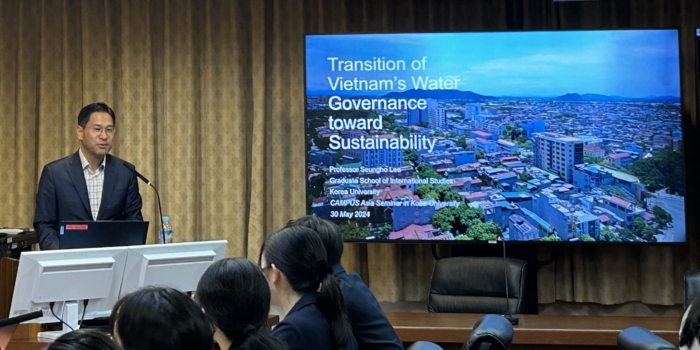Congratulations Party for Master’s Graduates
On Tuesday 18th August 2015, Ogawa seminar held a party to celebrate the successful completion and defence of master’s theses by three seminar students. It was a very delightful and...
Graduate School of International Cooperation Studies (GSICS), Kobe University


On May 30, 2024, Professor Seungho Lee of the Graduate School of International Studies, Korea University, Korea, delivered a lecture at the 175th JASID Kansai Seminar titled “Transition of Vietnam’s Water Governance toward Sustainability”. The seminar was held at the Main Conference Room, Graduate School of International Cooperation Studies, Kobe University, and virtually on Zoom. The seminar drew a large audience and attracted participants from Japan and Korea, connecting seamlessly through Zoom.
Firstly, Professor Lee explained the KOICA’s project for the establishment of the integrated water resources information management system in the Ma River basin of central Vietnam, and his pivotal role in the project. The project is a consortium of KICT, Yooshin Engineering Co., Dongbu Engineering, Co., and GEO C&I. The Ministry of Agriculture and Rural Development (MARD) and its related research institutes are involved as partners in Vietnam. He explained that the project outcomes include managing flood runoff, ensuring construction safety, and ensuring adequate water resource allocation to agricultural production and economic sectors through the active operation of reservoirs and irrigation facilities during drought season. Activities for this purpose include a master plan for water resources information management, a water information system for managing water resources data, a decision support system for water resources information management in the Ma River basin, and training courses for institutions and professionals managing water resources information.
Secondly, Professor Lee spoke on water governance and water resources law reform in Vietnam. He explained that the country has abundant water resources, but more than 60% of the available water comes from neighboring countries through transboundary rivers. Challenges included inappropriate economic measures, inadequate water data, and vulnerability to external influences regarding water resources availability. After that, Professor Lee referred to the recent implementation of several legislations concerning water governance. While there are many water-related laws, the seminar focused on institutional reforms in the water sector, including the introduction of the Water Resources Law in 1998 and its amendments in 2012 and 2023 as examples. Specifically, the 1998 Water Resources Law describes the efficient and sustainable use and conservation of water resources, with an emphasis on an integrated approach to water resource management. The 2012 Water Resources Law describes the introduction of a basic study, strategy, and plan for water resources, the basis for a database, water financing, and clarification of the transfer of responsibility and authority from MARD to MONRE (Ministry of Natural Resources and Environment). Moreover, the 2023 Water Resources Law clarifies water security, water resources protection, the collection and use of detailed data and information, and the authority of MONRE in water management.
Finally, Professor Lee explained the policy implications and the path to sustainable water resource management in the future. Specifically, the current situation exists because of a poor law enforcement, a lack of clear policies to promote water information and data sharing among water entities, and low investment in the water sector. The future political commitments should include cooperation among water entities, especially between MONRE and MARD, as a basis for improving water resource management, water information and data, prioritizing investments in water infrastructure, and diversifying financing instruments, including private sector participation. Professor Lee concluded that the path to sustainable water resources management requires structural and non-structural measures to improve water security as well as the ability to cope with climate change and a policy shift from a development focus to a sustainability focus.
At the end of the seminar, participants actively engaged in the question-and-answer session. Professor Lee provided incisive responses that reflected his expertise in managing water resources in Vietnam and its relation to neighboring countries. It was a valuable opportunity for us to learn about water governance and water management in Vietnam from an expert like Professor Lee. I would like to convey a sincere appreciation to Professor Ogawa for arranging this seminar.
Authored by Runjing Guo (Master’s Student)